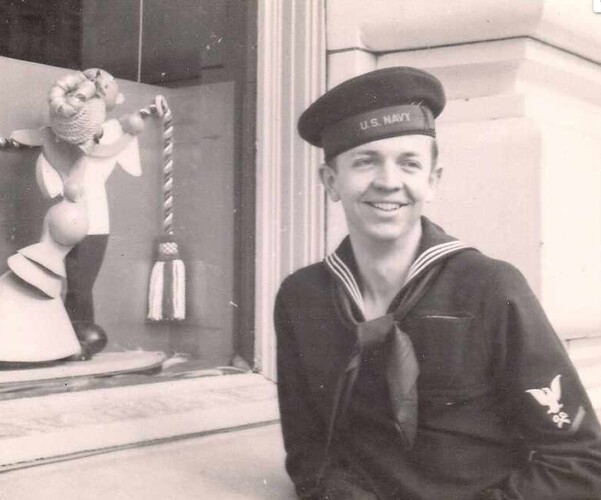Benjamin Orson Goddard (1917-1999) — he went by Orson — was a Salt Lake City boy who served in the U.S. Navy during World War II, almost immediately after filling a mission for The Church of Jesus Christ of Latter-day Saints in Australia.
He remained in the Navy beyond the end of the war, stationed in Manila, in the Philippines. In addition to his military duties, his private activities included dedicating the graves of fallen Latter-day Saint men, leading religious services among Latter-day Saints, and keeping scattered Latter-day Saint servicemen in touch with one another.

(FamilySearch) Latter-day Saint Benjamin Orson Goddard, who served in the Navy and led religious services.
Because of his distant location and still-unsettled conditions, delivery of his copy of the June 1945 issue of the Improvement Era, a Latter-day Saint magazine, was delayed until October of that year. He read it, including the ward teaching lesson (a message to be shared with all church members by men appointed to visit each household in the congregation monthly). Titled “Sustaining the General Authorities of the Church,” it cautioned members of their duty to freely support their religious leaders. “Any Latter-day Saint who denounces or opposes, whether actively or otherwise, any plan or doctrine advocated by the ‘prophets, seers, and revelators’ of the church is cultivating the spirit of apostasy.”
It concluded, “When our leaders speak, the thinking has been done. When they propose a plan – it is God’s plan. When they point the way, there is no other which is safe. When they give direction, it should mark the end of controversy. God works in no other way.”
That message, especially its conclusion, greatly bothered Goddard. He couldn’t accept it. Thinking, he firmly believed, was not alien to the gospel. But in rejecting that message, he wondered, was he guilty of the very sin of which it spoke? Did he put his own judgment above that of the Brethren, and had he “lost the spirit”?
Asking an apostle
He poured all of his thoughts and questions into a letter he wrote to a family friend: John A. Widtsoe, a Latter-day Saint apostle. Goddard reported that he had fasted and prayed to understand the position. “Frankly, my attitude doesn’t seem to have altered. I love what I know of the gospel more than all else. Yet without distorting the content of the message, I remain in a precarious position.”
Widtsoe wrote back immediately, telling Goddard that the message “was most unfortunately worded.” It was not, he said, “in harmony with the spirit of the church. We urge every person who comes into the church to learn to understand the gospel, so that he can stand upon his own feet.”
(The Church of Jesus Christ of Latter-day Saints) Latter-day Saint apostle John A. Widtsoe.
“He must think about the principles presented. Thinking is an important part of the life of people who come into the church; and after we are in, we must continue the same way, to use our powers in learning and practicing the principles of the gospel.”
Widtsoe did not know who had written the message but asked Goddard to “be merciful to the person.” He “had in mind that once the church ... decides on a course of official action, we must conform to it, else there would be nothing but chaos in the church. But even though we conform, we have the right, and should exercise the right, to think through the proposed procedure.”
Finally, Widtsoe told Goddard to “be at ease in your mind, therefore, that you are not an apostate or in the process of becoming one if you question the message of which you speak.”
After some time, Widtsoe’s letter reached Goddard, and Goddard replied. “I appreciate and am satisfied with your statement concerning the June Ward Teacher’s message. Thank you.”
(FamilySearch) Latter-day Saint Benjamin Orson Goddard, who served in the Navy and led religious services.
When questions arise today
As far as the past is any guide to the present, some Latter-day Saints who listen to messages from their leaders during this year’s October conference will struggle with, even reject, certain phrasing in talks, or even entire teachings. Some members of the faith who accept those teachings immediately, without question, may question or even reject those who express their questions. Some may mock those who accept the messages, whether immediately or after consideration, by asserting that Latter-day Saints are “sheeple,” people who blindly follow the dictates of leaders without thought and intelligence.
Thinking is not in opposition to the gospel, as Widtsoe told Goddard. It was, and remains, a necessary part of life within the faith. Don’t believe anyone who tells you otherwise.
(Francisco Kjolseth | The Salt Lake Tribune) Tribune guest columnist Ardis E. Parshall, surrounded by her stacks of books.
Ardis E. Parshall is an independent research historian who can be found on social media as @Keepapitchinin and at Keepapitchinin.org. She occasionally takes breaks from transcribing historical documents to promote the aims of the Mormon History Association’s Ardis E. Parshall Public History Award.
Editor’s note • This story is available to Salt Lake Tribune subscribers only. Thank you for supporting local journalism.







